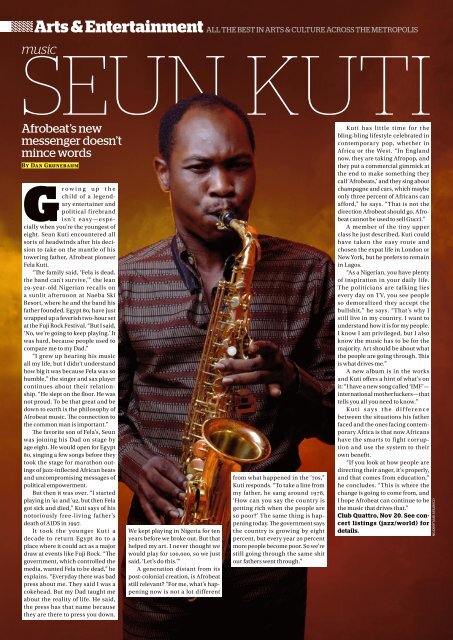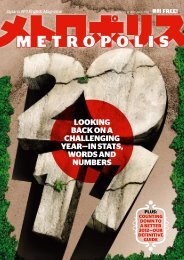Art Music the lAst Word sports **dining** - Metropolis
Art Music the lAst Word sports **dining** - Metropolis
Art Music the lAst Word sports **dining** - Metropolis
You also want an ePaper? Increase the reach of your titles
YUMPU automatically turns print PDFs into web optimized ePapers that Google loves.
<strong>Art</strong>s & Entertainment All <strong>the</strong> best in <strong>Art</strong>s & culture Across <strong>the</strong> metropolis<br />
Seun Kuti<br />
music<br />
Afrobeat’s new<br />
messenger doesn’t<br />
mince words<br />
By Dan Grunebaum<br />
Gr o w i n g u p t h e<br />
child of a legendary<br />
entertainer and<br />
political firebrand<br />
isn’t easy—especially<br />
when you’re <strong>the</strong> youngest of<br />
eight. Sean Kuti encountered all<br />
sorts of headwinds after his decision<br />
to take on <strong>the</strong> mantle of his<br />
towering fa<strong>the</strong>r, Afrobeat pioneer<br />
Fela Kuti.<br />
“The family said, ‘Fela is dead,<br />
<strong>the</strong> band can’t survive,’” <strong>the</strong> lean<br />
29-year-old Nigerian recalls on<br />
a sunlit afternoon at Naeba Ski<br />
Resort, where he and <strong>the</strong> band his<br />
fa<strong>the</strong>r founded, Egypt 80, have just<br />
wrapped up a feverish two-hour set<br />
at <strong>the</strong> Fuji Rock Festival. “But I said,<br />
‘No, we’re going to keep playing.’ It<br />
was hard, because people used to<br />
compare me to my Dad.”<br />
“I grew up hearing his music<br />
all my life, but I didn't understand<br />
how big it was because Fela was so<br />
humble,” <strong>the</strong> singer and sax player<br />
continues about <strong>the</strong>ir relationship.<br />
“He slept on <strong>the</strong> floor. He was<br />
not proud. To be that great and be<br />
down to earth is <strong>the</strong> philosophy of<br />
Afrobeat music. The connection to<br />
<strong>the</strong> common man is important.”<br />
The favorite son of Fela’s, Seun<br />
was joining his Dad on stage by<br />
age eight. He would open for Egypt<br />
80, singing a few songs before <strong>the</strong>y<br />
took <strong>the</strong> stage for marathon outings<br />
of jazz-inflected African beats<br />
and uncompromising messages of<br />
political empowerment.<br />
But <strong>the</strong>n it was over. “I started<br />
playing in ’91 and ’92, but <strong>the</strong>n Fela<br />
got sick and died,” Kuti says of his<br />
notoriously free-living fa<strong>the</strong>r’s<br />
death of AIDS in 1997.<br />
It took t he you nger Kut i a We kept playing in Nigeria for ten<br />
decade to return Eg ypt 80 to a years before we broke out. But that<br />
place where it could act as a major helped my art. I never thought we<br />
draw at events like Fuji Rock. “The would play for 100,000, so we just<br />
government, which controlled <strong>the</strong> said, ‘Let’s do this.’”<br />
media, wanted Fela to be dead,” he A generation distant from its<br />
explains. “Everyday <strong>the</strong>re was bad post-colonial creation, is Afrobeat<br />
press about me. They said I was a still relevant? “For me, what’s hap-<br />
cokehead. But my Dad taught me pening now is not a lot different<br />
about <strong>the</strong> reality of life. He said,<br />
<strong>the</strong> press has that name because<br />
<strong>the</strong>y are <strong>the</strong>re to press you down.<br />
10 • download our podcast at • podcast.metropolis.co.jp<br />
from what happened in <strong>the</strong> ’70s,”<br />
Kuti responds. “To take a line from<br />
my fa<strong>the</strong>r, he sang around 1978,<br />
‘How can you say <strong>the</strong> country is<br />
getting rich when <strong>the</strong> people are<br />
so poor?’ The same thing is happening<br />
today. The government says<br />
<strong>the</strong> country is growing by eight<br />
percent, but every year 20 percent<br />
more people become poor. So we’re<br />
still going through <strong>the</strong> same shit<br />
our fa<strong>the</strong>rs went through.”<br />
Kuti has little time for <strong>the</strong><br />
bling-bling lifestyle celebrated in<br />
contemporary pop, whe<strong>the</strong>r in<br />
Africa or <strong>the</strong> West. “In England<br />
now, <strong>the</strong>y are taking Afropop, and<br />
<strong>the</strong>y put a commercial gimmick at<br />
<strong>the</strong> end to make something <strong>the</strong>y<br />
call ‘Afrobeats,’ and <strong>the</strong>y sing about<br />
champagne and cars, which maybe<br />
only three percent of Africans can<br />
afford,” he says. “That is not <strong>the</strong><br />
direction Afrobeat should go. Afrobeat<br />
cannot be used to sell Gucci.”<br />
A member of <strong>the</strong> tiny upper<br />
class he just described, Kuti could<br />
have taken <strong>the</strong> easy route and<br />
chosen <strong>the</strong> expat life in London or<br />
New York, but he prefers to remain<br />
in Lagos.<br />
“As a Nigerian, you have plenty<br />
of inspiration in your daily life.<br />
The politicians are talking lies<br />
every day on TV, you see people<br />
so demoralized <strong>the</strong>y accept <strong>the</strong><br />
bullshit,” he says. “That’s why I<br />
still live in my country. I want to<br />
understand how it is for my people.<br />
I know I am privileged, but I also<br />
know <strong>the</strong> music has to be for <strong>the</strong><br />
majority. <strong>Art</strong> should be about what<br />
<strong>the</strong> people are going through. This<br />
is what drives me.”<br />
A new album is in <strong>the</strong> works<br />
and Kuti offers a hint of what’s on<br />
it: “I have a new song called ‘IMF’—<br />
international mo<strong>the</strong>rfuckers—that<br />
tells you all you need to know.”<br />
K u t i s a y s t h e d i f f e r e n c e<br />
between <strong>the</strong> situations his fa<strong>the</strong>r<br />
faced and <strong>the</strong> ones facing contemporary<br />
Africa is that now Africans<br />
have <strong>the</strong> smarts to fight corruption<br />
and use <strong>the</strong> system to <strong>the</strong>ir<br />
own benefit.<br />
“If you look at how people are<br />
directing <strong>the</strong>ir anger, it’s properly,<br />
and that comes from education,”<br />
he concludes. “This is where <strong>the</strong><br />
change is going to come from, and<br />
I hope Afrobeat can continue to be<br />
<strong>the</strong> music that drives that.”<br />
Club Quattro, Nov 20. See conce<br />
rt list i ng s (j a z z/world) for<br />
details.<br />
courtesy of plAnkton












